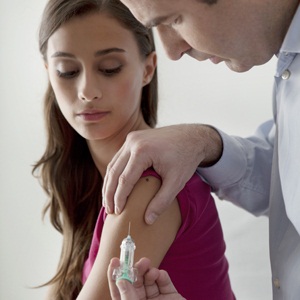
A new long-term study shows that the human papillomavirus (HPV) vaccine appears to protect against the sexually transmitted virus for at least eight years.
HPV is thought to cause the majority of cervical cancers. Certain strains, such as HPV 16 and 18, are most strongly tied to these tumours. The virus is also believed to cause genital warts in both men and women and certain head and neck cancers.
Among the vaccinated preteens in the new study, none developed any of the diseases or conditions associated with HPV during the study period, the researchers reported.
"The body's response against HPV by making antibodies looks very good at eight years, and it seems like no booster doses will be necessary," said lead researcher Dr. Daron Ferris, director of the HPV epidemiology and prevention program at Georgia Regents University in Atlanta.
Read: Sexually active gay teenagers at risk for HPV
"There are all indications that the vaccine is safe, and it looks like it's effective in preventing genital warts and other diseases caused by HPV," he added.
The report was published online in the journal Paediatrics.
Thousands will die if not vaccinated
Dr. Adriana Cadilla, a paediatrician at Miami Children's Hospital, said, "It is very promising that we now know that we are going to have protection for at least eight years."
For the study, the researchers randomly assigned 1,781 sexually inactive boys and girls aged 9 to 15 to the HPV vaccine or placebo shots. After eight years, those who received the vaccine still had antibodies against HPV, they found.
"If you haven't had your child vaccinated, please get them vaccinated," Ferris said. "It's more dangerous not to give the vaccine to your children. Thousands of people will continue to die each year if they are not vaccinated."
Read: HPV vaccine a great success in England
Despite the vaccine's benefits, only about 57 percent of girls aged 11 to 15 are getting the first dose of the vaccine, and only 33 percent are getting all three doses. Among boys, about 34 percent are getting the first dose of the vaccine, but only about 14 percent are getting all three doses, according to the U.S. Centres for Disease control and Prevention.
Vaccine recommendations
The CDC recommends that all kids aged 11 to 12 should get the three doses of HPV vaccine.
Ferris noted that getting all three doses is important. "The third dose is the booster dose, and that's what's going to convey long-term protection," he explained.
Read: One dose of HPV vaccine may prevent cervical cancer
A survey published in the same journal issue examined the reasons more girls aren't getting vaccinated.
"Almost everybody [parents and doctors] we talked to thought getting the vaccine was a good idea," said survey author Dr. Rebecca Perkins, an assistant professor of obstetrics and gynaecology at Boston University School of Medicine.
"They thought that preventing cancer is good and that all girls should get vaccinated," she said. "What was happening was a problem with timing."
Doctors weren't suggesting the vaccine for girls aged 11 to 12, Perkins said. They thought the vaccine should be given later, when girls are more likely to be sexually active, she said.
Doctors and parents were thinking more about how the virus is transmitted, rather than about the vaccine as a way to prevent cancer, she said.
Cultural prejudices
"Everyone needs to focus on why we are giving the vaccine, which is to prevent HPV-associated cancers, rather than on how one gets HPV," Perkins said.
High vaccination rates were achieved when doctors looked at the HPV vaccine as a normal part of the vaccination schedule. In addition, talking about preventing cancer was a more successful approach than talking about HPV as a sexually transmitted infection, the researchers added.
Cadilla wasn't surprised by the survey findings. "We have known that we have not been doing a good job vaccinating girls and boys," she said.
Cultural prejudices about sex need to be overcome, Cadilla added. "A lot of times because HPV is a sexual disease, it will scare parents off," she said. "But you never know when your child is going to start having sex."
Read: The deadly alliance of STDs and HIV
Cadilla advises parents to have their kids vaccinated. "You are preventing something from happening in the future," she said.
Perkins' findings were based on interviews about HPV and the vaccine with 124 parents and 37 doctors.
Read more:
Schoolgirls in North West get HPV vaccination
CANSA CEO responds to Government's HPV vaccine roll-out
Image: Cervical cancer vaccine from Shutterstock
See breaking news and the hottest health tips before anybody else by joining South Africa’s biggest and best health community, like health24 on Facebook now!




 Publications
Publications
 Partners
Partners















